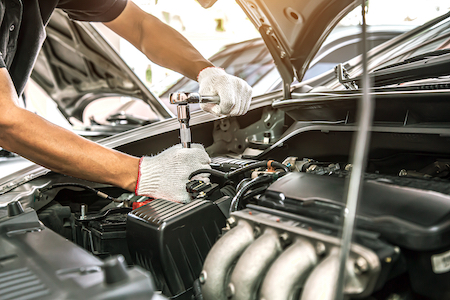You know the feeling. Your car’s acting up, and you’re bracing yourself for a trip to the repair shop. You want answers, not upsells. You want to feel like someone’s looking out for you, not just finding a way into your wallet. And in a city like Denver, with cars tackling everything from downtown traffic to snowy mountain drives, you need someone who truly understands your lifestyle.
What you want is affordable and honest auto repair. But is that even possible? Does it exist?
We think so. We’re pulling back the curtain on what trustworthy auto care should look like … and, maybe more importantly, how you can find a shop that treats you like more than just a line item.
Whether you’re new to town or a longtime local, here’s how to find (and stick with) a mechanic who has your back.
Why “Honest Auto Repair” Matters More Than Ever
We’ll just say it: auto repair has a reputation problem. We’ve all heard the stories—surprise invoices, unnecessary repairs, and mechanics who seem to speak a language all their own. It’s frustrating, especially when you rely on your car every single day.
But here’s the truth: car care doesn’t have to be confusing. Or expensive. Or stressful.
At its core, honest auto repair is about trust. It’s about clear communication, fair pricing, and the confidence that your mechanic is working with you—not just charging you.
And in a place like Denver, where your car has to handle winter storms, high-altitude performance, and the occasional road trip to the mountains, having a reliable repair shop isn’t a luxury. It’s a necessity.
What Honest and Affordable Auto Repair Looks Like
So how do you know if a repair shop is the real deal? We know everyone can define that in different ways, but here are a few things we believe every customer should expect:
Clear Explanations (Not Confusing Jargon)
A good mechanic will walk you through the problem in plain English, show you what’s going on, and help you understand your options. No pressure, no scare tactics—just straightforward info to help you make the right call.
Estimates Before Work Begins
You should never be surprised when you see the final invoice. An honest shop will give you a detailed estimate, get your approval before doing the work, and explain any changes along the way.
Transparency with Pricing
Affordable doesn’t mean “cheap.” It means fair. It means not charging you for things you don’t need. A trustworthy shop will help you prioritize what matters now and what can wait—because we know budgets are real, especially these days.
Long-Term Solutions, Not Band-Aids
Some shops just patch the problem and send you on your way. We believe in lasting fixes. If there’s something deeper going on, you deserve to know—so you can make informed decisions and avoid repeat issues.
How to Spot a Shop You Can Trust
Let’s talk about what to look for when you’re searching for a new mechanic in Denver. Whether you’re Googling “affordable auto repair near me” or asking a neighbor for a recommendation, here are a few signs you’re in the right place:
They answer your questions patiently. No eye rolls, no rush.
They show you what they find. Whether it’s a worn brake pad or a leaking hose, a good shop will offer photos, videos, or walk you through the issue in person.
They explain the “why” behind repairs. Not just “what’s broken,” but why it matters and how it affects your safety or performance.
They treat you like a partner, not a paycheck. They understand you’re maintaining a car, not just fixing a problem. And they help you plan for what’s next.
And let’s not forget: word-of-mouth still matters. Online reviews, repeat customers, and community reputation are all great indicators of a shop that puts people first.
Why Denver Drivers Deserve Better
Living and driving in Colorado is always changing. One week you’re stuck in downtown traffic; the next you’re navigating snowy switchbacks through the mountains. Our cars take a beating. And that makes it even more important to have a mechanic who knows what local driving really does to your vehicle.
Denver drivers need:
- Cooling systems that can handle 90-degree July days and sub-zero January mornings.
- Brake systems that perform on steep inclines and icy roads.
- Tire care that factors in mountain driving, road salt, and high altitude wear.
A shop that understands Denver life will be able to recommend the right services at the right time—so your car stays safe and dependable year-round.
Affordable Doesn’t Mean Cutting Corners
We get it—car repairs can be expensive. But here’s the thing: affordable auto repair isn’t about the lowest price. It’s about value.
We believe in helping drivers make smart decisions for their budgets. That might mean:
- Giving you a heads-up on what’s urgent vs. what can wait
- Recommending parts that balance price and performance
- Offering maintenance tips that prevent future problems
- Helping you space out services so you’re not overwhelmed all at once
Because fixing one minor issue now can save you from a major repair later. And that’s real value.
Building a Relationship with Your Mechanic
Here’s something we don’t talk about enough: car care works best when it’s a partnership. When you have a mechanic who knows your car, your driving habits, and your goals, it’s easier to stay ahead of problems and plan your maintenance around your life—not the other way around.
A good mechanic becomes part of your routine—like your dentist, your doctor, your go-to coffee shop. Someone you trust to keep things running smoothly.
Let’s Get You Back on the Road
If your car’s making a weird noise, the check engine light is on, or it’s just been a while since you’ve had a trusted shop look it over, we’re here for you.
We don’t believe in upsells, pressure tactics, or confusing invoices. We believe in long-term care, honest answers, and giving Denver drivers a place they can feel good about coming back to.
So whether you’re due for maintenance, need a second opinion, or just want to build a relationship with a shop that puts people first—give us a call or stop by.
Because affordable, honest auto repair isn’t just a tagline. It’s the way we do business.










